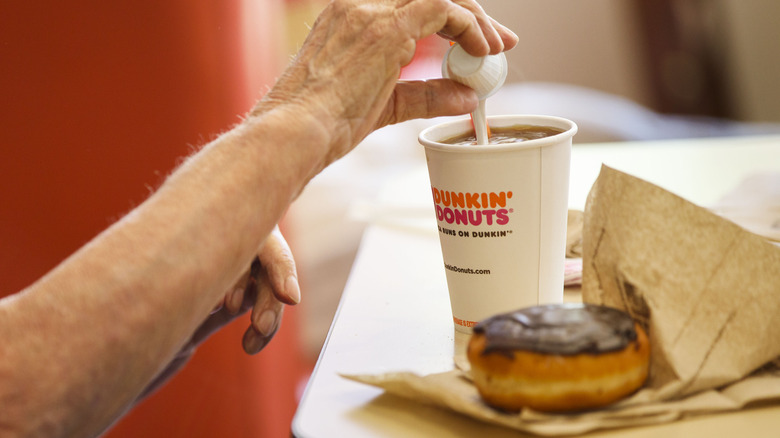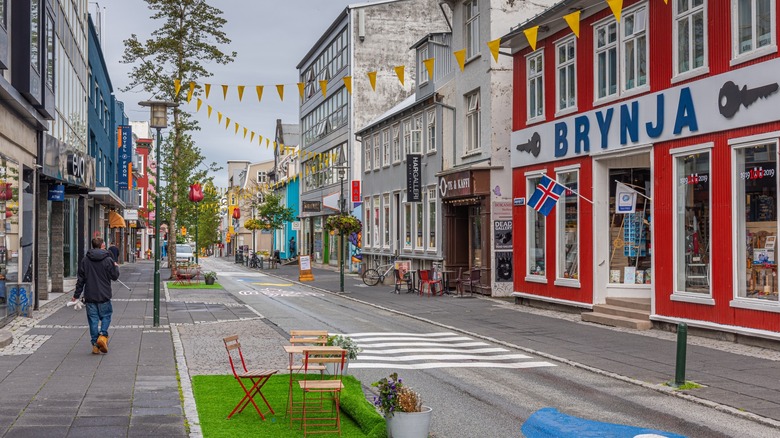The Reason You Won't Find A Single Dunkin' In Iceland
America might be known for running on Dunkin', but it's certainly not the only place that does. The coffee and donut shop franchise has blown up into a multinational operation in the few decades since its humble inception in Quincy, Massachusetts. To date, you can find about 13,200 Dunkin' locations across almost 40 countries in Latin America, Europe, and Asia.
However, there is one country where you will likely never stumble across the familiar orange and pink logo: Iceland. Dunkin' did have a stint on the Nordic island, but it was short-lived — the first Icelandic location opened in 2015, and the last closed in 2019. Though Icelandic locals were generally excited about its introduction, its eventual closure came down to a fatal flaw for any business — an insufficient bottom line. Despite its apparent success in thousands of other locations worldwide, the unique aspects of Iceland made the Dunkin' business model incompatible.
The rise and fall of its Iceland empire
Dunkin' missed the target with its opening in Iceland, but not for a lack of interest in the product. Coffee culture in Iceland is undoubtedly strong, with FAOSTAT reporting that the average local consumed about 12.6 kilograms in 2021 (via Helgi Library). Hoping to capitalize on the population's demand for a good cup of joe, Icelandic company Basko franchised Dunkin' in 2015. Over the next few years, Basko opened four locations: three in Reykjavík, Iceland's capital and most populous city, and one in the nearby Keflavík International Airport.
However, the Icelandic coffee craze was not enough to keep these locations afloat. In a media statement released upon the closure of the last location, Basko director Sigurður Karlsson explained, "The cost of production was too much and we had to face the fact that we either had to raise prices by a large degree, or shut it down."
He did not break down the specific causes of these high costs, but geographical barriers likely played a key role. As a lone island nation, Iceland's closest neighbor is the mostly untouched Greenland. Keeping up a supply chain in this remote location would be costly work. Even though the novelty of the American brand led to lines out the door in Dunkin”s early Reykjavík days, the ultimate performance of the brand in Iceland was not worth the expense of maintaining each location.
Why Dunkin' may not do it for everyone
Iceland is not the only place devoid of Dunkin', though. Similar issues with high production costs have led to dwindling Dunkin' locations in other countries in Europe's Nordic region, including Sweden and Denmark. Moreover, Dunkin's convenience-forward model does not always align with the common coffee rituals in some regions. Italian coffee culture, for instance, is the antithesis of fast-service big brands like Dunkin'. Many Italians will order espresso drinks at a bar, receive a saucer full of fresh brew, and drink the whole cup then and there. While the primary commodity of Dunkin' is the coffee itself, the ambiance of a café or bar is just as vital to the coffee-drinking experience in Italy. A to-go coffee order is a rare occurrence, and as such, Dunkin' has yet to appear in the European coffee capital.
Although Dunkin' seems ubiquitous in certain parts of the world, especially the Northeastern United States, its company features make it less agreeable in certain places. If you're a Dunkin' die-hard, beware of its deserts during your travels — and perhaps immerse in the local coffee scene instead.


